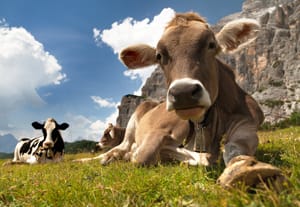Making It Hard for Small Family Farms to Survive
[This article was previously published in the fall issue of The Cultivator, Cornucopia’s quarterly newsletter.]
by Kestrel Burcham, JD
Director of Domestic Policy at The Cornucopia Institute
Patty and Brian Wilson own a 600-acre farm in Vermont where, with the help of family, they have milked a small herd of dairy cattle for 23 years. The Wilson Farm made the transition to organic dairy 15 years ago. The transition was an easy one, because they were already dedicated to grazing as much as possible and using few inputs associated with conventional dairying (e.g., frequent use of antibiotics).
 |
After years of financial stability, the Wilsons have now put their dairy herd up for sale. While still milking approximately 45 cows, they fear their future as a family dairy may be coming to a close.
With the recent surplus of organic milk on the market generated by large industrial-organic dairies, small, exemplary grass-based dairies like the Wilsons are coming up short.
Patty spoke frankly about their situation and the problems family farms are facing in the current dairy crisis: “When greed entered the market in the form of large farms, it became hard for small farms to survive.”
Patty noted that her farm has always prided itself on raising high quality animals. In the past, they even showed some of their animals in competition.
Like many family-scale farms, the Wilsons also have a strong bond with their cattle, even considering them part of the family. The natural side effect of this exceptional care is longevity and health in their dairy herd.
With such healthy animals, the calves born on the farm are often considered surplus. Historically, the Wilson Farm always made ends meet by selling their high-quality replacement animals to other organic farms. Unfortunately, as larger dairies have moved into their area, that source of income has dried up.
Large industrial dairies do not buy healthy calves from farms like the Wilsons’, nor do they raise their own. Instead, these operations purchase cheap, conventional cattle raised on medicated milk replacer containing antibiotics and, potentially, other banned pharmaceuticals.
After weaning, these calves are fed conventional GMO grains and hay treated with chemicals prohibited in organic agriculture. These animals are being raised conventionally until their first birthday. Sometime during the second year of life, approximately one year before they start producing milk, they are “transitioned” to organic management.
Meanwhile, baby calves on the Wilson Farm, and the preponderance of organic family dairies, receive the same quality of organic milk you would find in the grocery store and consume certified organic feed for the balance of their lives. This much more expensive process leaves ethical organic producers competitively disadvantaged.
While this animal cycling should be illegal, the USDA has refused to act either to enforce the current standards or to provide guidelines which would require certifiers to weed out bad actors in the dairy industry.
In the meantime, ethical dairies are feeding their calves the organic milk from their mothers (industrial-organic producers have no calves to feed and sell all milk to consumers), and the market for their high quality, young organic dairy animals no longer exists. Under these conditions, it is hard for any family dairy to survive.
Patty observed that one litmus test for industrial dairies lies in the amount of time livestock spend on grass. The current grazing requirement under organic certification is only 30% and often poorly enforced. If the provision was raised to 50% or more, and enforced, many industrial dairies would have objectionable operations.
Cornucopia policy experts advocated for these benchmarks when the regulations were rewritten. In the past, switching to organic production was supposed to be the cure for family farms in the age of industrialization. Now, the promise of organic agriculture is on tenuous footing.
Consumers invested in helping the true heroes of the organic dairy marketplace—family farms—can make discerning choices using Cornucopia’s Organic Dairy Scorecard. For a greater dive into the issues facing ethical organic dairy farmers, interested readers can also check out Cornucopia’s updated Dairy Report: The Industrialization of Organic Dairy.

